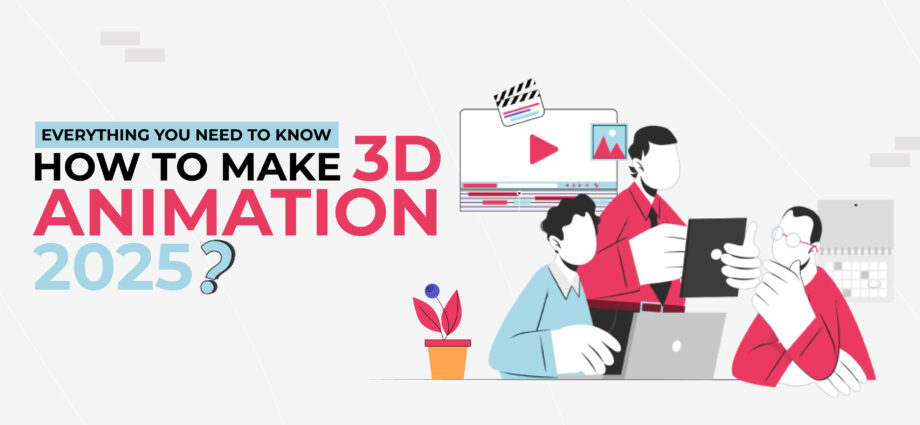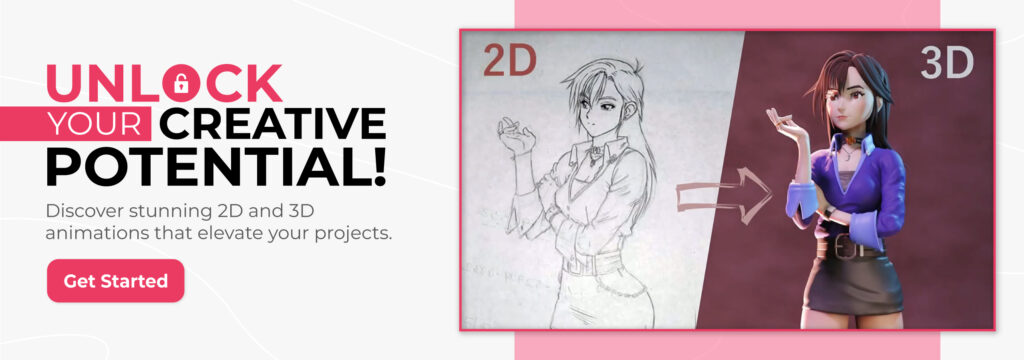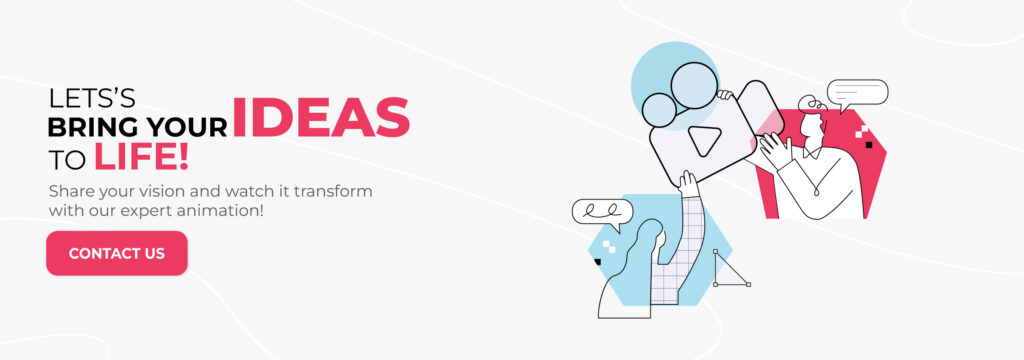Since childhood, we all have seen 3D animation. Sometimes in video games, movies, features, tv series, and advertisements.
It is an art genre that began in 1960s experimentation but did not become popular until the 1995 animated movie Toy Story was released.
Now, 3D animation has reached the pinnacles of success. It’s an omnipresent and ever-expanding animation art form and to thrive in this space is no small feat.
If you’re willing to take the risk, give it a shot and make your career in it, the first thing you need to determine is how you’re going to do it – how to make 3D animation?
To help you out in this brief guide, we’ll walk you through the whole process of 3D animation step by step.
So, without any further ado, let’s get started!
How To Make 3D Animation – The Process
You must be familiar with the fact that 3D animation is quite a technical art form, and the whole process of 3D animation is complex. Apart from having a specific skill set, it goes through various production stages.
Each stage is intricate in its own way. You need to have different skills and good creativity to make a quality 3D animation video.
3D animation stage breakdown:
- Plan a creative concept
- Write a compelling script.
- Turn words into a storyboard.
- Develop a 3D model.
- Add textures.
- Draw a virtual skeleton of character with rigging and skinning.
- Animate your creation.
- Render animation.
- Add special effects through VFX and compositing.
- Include catchy music and other sounds.
- Edit the video.
- Process the final render.
Phew!
The process of producing a 3D animated video appears to be an exhaustive list of Must-dos.
So how about a guide that makes it super easy to navigate through, step-by-step.
Let’s now take a look at each production stage to learn how to make a 3D animation in great detail.
1) Concept
This is where the whole animation process starts. The animation industry giants such as Pixar, Disney, and Illumination spend months developing compelling ideas for their pieces.
Share concept and invite feedback
It’s a great idea to share it with peers so it will be easier for you to determine whether the idea or storyline you’ve come up with will be successful or not.
2) Scriptwriting
Scriptwriting is the process of writing the whole storyline in the screenplay medium. When writing a script for a 3D animation video or film, you have to jot down each and every expression, dialogue, movement, and action.
Invest in a quality script
People who encompass a creative flair find it easier to write gripping scripts. If you’re not good at writing, you always seek assistance from professional scriptwriters.
3) Storyboard
A storyboard is basically a graphic representation of how your animation will unfold, scene by scene. A storyboard visually guides you throughout the 3D animation production process.
Draw important scenes
Begin the process by creating blank slides and drawing each scene to show the video sequence.
Make sure visuals complement the script
There are plenty of storyboarding templates available on Google. After drawing the scene, add your script and then sketch your story.
Stylize your videos with animated captions.
4) 3D Modeling
3D modeling is one of the most integral parts of the 3D animation production process.
The popular HBO series, Game of Thrones uses a 3D modeling technique to make every episode.
Best software for 3D Modeling
Animators use 3D modeling software to make a 3D model of their characters and objects. They use software like Spine,3D Max, 3D Maya, to name a few.
5) Texturing
Texturing is the process of making the outer layer of an object. It could be the clothing or skin, even hair of your animated characters; metallic polishing for a machine or car; whiskers of a cat, masonry of a house or a building, etc.
Who performs texturing?
Texture artists are professional people who are involved in this stage of production.
6) Rigging and skinning
The term rigging might sound a bit weird, especially to those who have just started exploring the 3D animation industry.
What is rigging?
Primarily, rigging is constructing the skeletal and muscular base of your animation. The rigs of a character allow the moving parts and joints of the object to move realistically.
Who does rigging?
Character riggers will create the working skeletons of a 3D animation character.
What is skinning?
Skinning is the technique to smooth out all the joints and moving parts. You can consider it as giving skin to all the underneath mechanics to hide them.
7) Animation
Now comes the main part, animating your characters and objects. You have to animate them through a scene or sequence of moments.
Creates effects that evoke the desired emotion
This is the stage when your script and storyboard come into action. To begin, a layout must be decided by generating a set and populating it with items.
Master keyframing
They must be animated by giving animation variables to objects and characters. Following that, models within the scene may be brought to life via motion capture and keyframing.
Use the top animation software
For animation, you can use different 3D animation software such as K-3D, Blender, Daz 3D, Wings 3D, to name a few. Or if you’re struggling because of the steep learning curve in 3D, feel free to hire for 3D animation services and outsource the animation part
8) Rendering
Rendering, or picture synthesis, is the process through which a graphics processing unit generates a three-dimensional animation (GPU).
Pay attention for a good render
To achieve a good render, you need to flawlessly manage texture mapping, shaders, reflection, shadows, depth of field, transparency, and motion blur.
9) VFX & compositing
Compositing is the process of combining many renders passes to create the final animation. It is a technique for fine-tuning features such as shading, lighting, and color by adding layers to a single or sequence of photographs.
Use Software to tweak multiple elements
Visual effects are created as independent renderings. You can blend them all together using composting software like Nuke and After Effects.
10) Sound effects and Foley
All of the animation’s audio parts are developed in a sound studio.
Make sure each cut syncs with sound
Sound effects include recording of the score and all the necessary musical parts and embellishments for the animation. Make sure that the music is synchronized with and complements the pictures.
Use Foley to enhance the audio experience
Foley is the process of creating all the necessary sound effects for a composition. Once these audio pieces are complete, they are subjected to sound edit and mix to ensure they are in rhythm with the action.
11) Editing
Even though the animation is created after making a storyboard, it still needs some edits to make it PERFECT!
Edit for smooth storytelling
It needs edits to cut unwanted scenes, time out all the scenes sequence by sequence, and alter the final sound effects.
12) Final rendering
Now when you have made a storyboard, animated it, rendered it, and made final edits, it’s time to one final render.
Do it with great diligence
Before hitting the button for final rendering, make sure you go through each and everything thoroughly because there’s no turning back.
After the final rendering is done, your 3D animation production process ends.
So, that’s how to make 3D animation.
Now let’s talk about how to become a 3D animator and what it takes to become a successful one.
How to start your career as a 3D animator?
To become a successful and professional 3D animator, you can use the following roadmap:
Give it time
You first must understand that it’s not something you can accomplish in weeks, months, or even years. It’s a whole process that calls for a lot of dedication and a great deal of determination and love.
Aim for consistent improvement
You can start by doing small experiments for self-learning. Once you have a good command on small and simple things, navigate your way through complex elements of this process.
Develop a diverse skillset
You should be a complete package to be a successful animator. Be it writing a script, rendering your project, or making final edits; you should know how to do each and everything.
Experiment with fresh ideas
Though it could be a little daunting, you need to push your boundaries to become a more sophisticated animator if you really want to be successful.
Invest in your portfolio
It’s a good idea to make a professional portfolio that you can pitch to your client. Portfolio is a clear proof of your talent in animation.
All set to make a stellar 3D animation video?
To sum it up, the whole process of 3D animation production calls for a lot of effort, time, and patience.
However, if you have the devotion to produce great artwork, and have the innate desire to constantly improve as a 3D animator, nothing can stop you from reaching your goal.
Also, if at any point in your work, you find yourself under the water, feel free to reach out our team at BuzzFlick, one of the most reputable 3d animation production companies that offer a full variety of video production services, including whiteboard animation, explainer video animation, and 2D & 3D animation services.
Remember, the 3D animation industry is expanding, and becoming a 3D animator can bring you great fortune, so make your decision wisely.







